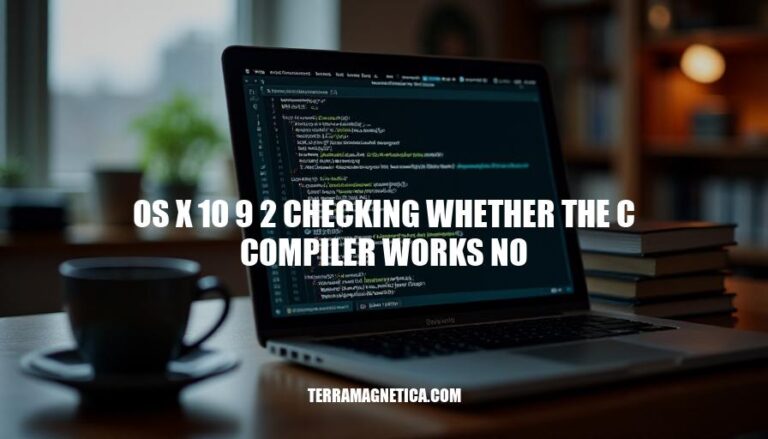


The issue of “OS X 10.9.2 checking whether the C compiler works… no” is a common problem faced by developers using macOS. This error typically occurs when the system fails to verify the functionality of the C compiler, often due to missing or misconfigured development tools like Xcode or Command Line Tools. This can hinder software installation and development, making it a relevant concern for many users.
Here are some common causes for the “OS X 10.9.2 checking whether the C compiler works… no” error:
Missing Xcode Command Line Tools: If the Xcode Command Line Tools are not installed, the compiler won’t work. You can install them using:
xcode-select --install
Incorrect Compiler Paths: If the compiler paths are not set correctly, the system won’t be able to find the compiler. Ensure that the paths are correctly set in your environment variables.
Outdated or Corrupted Xcode Installation: Sometimes, an outdated or corrupted Xcode installation can cause this error. Reinstalling Xcode can help resolve this issue.
Permissions Issues: If there are permissions issues with the directories where the compiler is trying to write, it can cause this error. Ensure that you have the necessary permissions.
Incompatible Compiler Versions: Using an incompatible version of the compiler can also lead to this error. Make sure you are using a compatible version of GCC or Clang.
Configuration Issues: Sometimes, the configuration scripts might have issues or might not be compatible with the current setup. Reviewing and adjusting the configuration scripts can help.
If you encounter this error, checking these common causes can help you troubleshoot and resolve the issue.
Sure, here are the detailed troubleshooting steps to resolve the ‘OS X 10.9.2 checking whether the C compiler works no’ error:
Verify Xcode Installation:
xcode-select --install
Check Xcode Path:
sudo xcode-select -switch /Applications/Xcode.app/Contents/Developer
Accept Xcode License:
sudo xcodebuild -license
Verify Compiler:
gcc --version
clang --version
Update Environment Variables:
.bash_profile or .zshrc file:export CC=/usr/bin/gcc
export CXX=/usr/bin/g++
source ~/.bash_profile
# or
source ~/.zshrc
Check for Multiple GCC Installations:
which gcc
which g++
Inspect config.log:
config.log file in the directory where the error occurred. This file often contains detailed error messages that can help diagnose the issue.Reinstall Xcode:
sudo rm -rf /Applications/Xcode.app
sudo rm -rf /Library/Developer/CommandLineTools
xcode-select --install
Following these steps should help resolve the issue.
Here are some advanced solutions for the persistent “checking whether the C compiler works… no” issue on OS X 10.9.2:
xcode-select --install to install the necessary command line tools.PATH, are correctly set to include the paths to your compilers.clang instead of gcc by setting the CC environment variable to /usr/bin/clang.brew update and reinstall any necessary packages.These steps should help you troubleshoot and resolve the compiler issue.
The ‘OS X 10.9.2 checking whether the C compiler works… no’ error is a common issue that can hinder software installation and development on macOS.
To resolve this, it’s essential to identify and address the underlying causes, which include:
Troubleshooting steps involve:
Advanced solutions include: